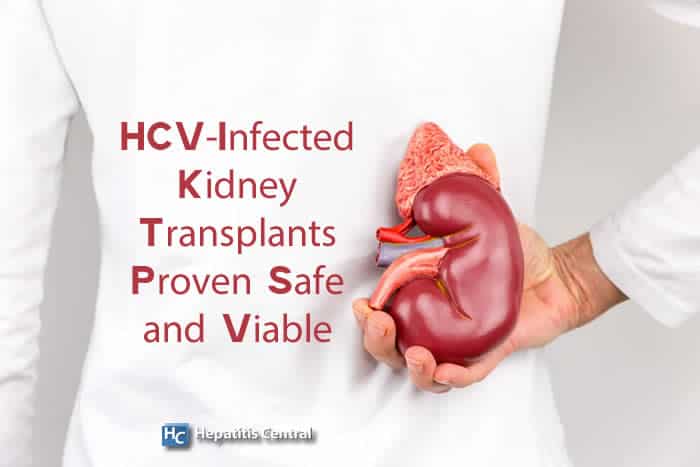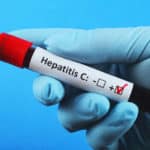HCV-Infected Kidney Transplants Proven Safe and Viable


The Waiting List
If you are one of the 94,878 people currently on the U.S. kidney transplant waiting list you may be more than interested in a recent Penn Medicine study in conjunction with the National Transplant Registry that found kidneys from donors who are positive for the Hepatitis C virus are making for successful transplants a year after surgery (1). This means more opportunity for viable transplants for people on dialysis, but there is still a shortage of viable organs for transplant in the U.S.
While just over a year ago it may have been counterintuitive to think that a kidney infected with hepatitis C virus could serve as a viable transplant organ, that’s exactly what HCV kidneys are appearing to be good for so long as the transplant coincides with Zepatier, an antiviral treatment made by Merck (2).
Whereas a huge percentage of infected kidneys were being discarded, now the medical and scientific communities have embraced the use of HCV infected kidneys because they’ve been proven widely successful and don’t get rejected (2).
The kidney is the organ with the highest transplant demand, eclipsing the liver which, by comparison, only has 13,023 on the waiting list (3). From January to September of 2019 the total transplants performed was 29,847, which is why the wait times for a kidney transplant can take up to 5 years for some (3).
Kidney Transplant Stats and Risks
Our kidneys are two fist-sized organs on either side of our spine and just below our rib cage (6). They mainly help us filter waste from the blood through our urine but, if they have a problem, then waste can accumulate in the blood – which leads to high blood pressure and eventually kidney failure, a.k.a. renal failure (4).
While the Penn Medicine research and others have proven themselves and incited a positive shift in how we can treat kidney disease, there is still a bit of risk involved in getting a kidney transplant regardless of whether the donor’s kidney is HVC positive or not.
According to the National Kidney Foundation, nearly 3,000 people will lose their kidney transplant in the first year, 6,000 within 3 years and, at the 10-year mark, just 54% of transplant kidneys still work (5). This is another reason the transplant list is so long, because over 20% of annual kidney transplants are re-transplants. But for those on dialysis, the wait may be worth it.
While kidney transplants are generally a low-risk procedure, there are still a small percentage of them that are rejected by the body. If 93% of transplants are accepted at the end of one year, that means 7% are not (5).
Some of the largest reasons a transplant may not take are below:
- Clotting – Clotting shortly after surgery can inhibit blood flow to the new kidney, leading to rejection.
- Excess Fluids and Infection – Fluid can collect around the new organ and lead to rejection or possibly infection.
- Side Effects of Medicines – Some medicines are harmful to the kidneys. Be sure to talk to your doctor before changing any routines or treatments.
- Non-Adherence/Compliance – Some people stop taking their anti-rejection medicines or miss doses which can lead to a rejection of the organ.
A few simple lab tests can tell you if you are at risk for any kidney-related issues. Blood pressure, creatine in the blood, protein levels in the urine, and your Glomerular Filtration Rate (GFR) are all great indicators of kidney health (6). A breakdown of what different results on those tests could mean can be found here on kidney.org.
If you’re wondering if you may be experiencing kidney problems, according to kidney.org, here are some of the major symptoms:
- Lack of energy or weakness
- Painful urination, foamy urine, pinkish or darker urine
- Increased thirst
- Increased urination frequency
- Swollen head, face, abdomen, and extremities
- Puffy eyes
Prevention
Even if you and your loved ones aren’t on the kidney transplant waiting list, being proactive about your kidney health is crucial to staying off the list. Eating a low-sodium, low-phosphorus, low-potassium, and low-fat diet can keep your blood pressure in check.
As usual with prevention and general health, regular exercise of any kind is one of the best ways to keep your kidneys healthy. Drink lots of water and eat foods with omega-3s, like fatty fish.
If you’re currently on dialysis, your kidney may be much more sensitive and calls for a much more restrictive, well-planned diet. But dialysis or not, building a diet and healthy habits requires a plan and the meticulous tracking of calories, fats, proteins, and carbohydrate intake (7).
Living with One Kidney
As far as being a donor goes, most people can lead a healthy, normal life with just one of their kidneys (8). A rare few are even born with a single kidney, which is a condition called renal agenesis (8). Ginger and vitamins B1, B2, B3 (niacin), B6, B12, folic acid, pantothenic acid, biotin and a small dose of vitamin C are some of the supplements typically safe and healthy for the kidney, but always run any dietary or supplementary changes by your doctor or dietician first.
Winning the Fight
UriCare is an easy, cost-effective herbal supplement that ensures natural kidney support and urinary tract health on a daily basis.
If you’re on the waiting list, this new paradigm shift towards HCV-infected organs for transplants will hopefully alleviate the wait and keep more people off of dialysis, which can be a victory in and of itself.
If your situation isn’t as dire, exercise and supplements are the best way to ensure kidney health, along with good eating habits. Stay positive. Stay informed. And use these tips to set your kidneys up for success.
- Goldberg, D. S., Bloom, R. D., Sawinski, D., Abt, P. L., Blumberg, E. A., & Reddy, R. (2019, September 12). Hepatitis C-Infected Kidneys Function Similar to Uninfected Organs One Year After Transplant – PR News. Retrieved October 27, 2019, from https://www.pennmedicine.org/news/news-releases/2019/september/hepatitis-c-infected-kidneys-function-similar-to-uninfected-organs-one-year-after-transplant
- Schaefer, M. A. (2019, October 7). Hep-C infected kidneys do as well as uninfected organs after transplant, study finds. Retrieved October 24, 2019, from https://www.baltimoresun.com/sns-tns-bc-health-hep-c-infected-kidneys-transplant-20191007-story.html
- Health and Human Services, D. of. (2019). Organ Procurement and Transplantation Network. Retrieved October 27, 2019, from https://optn.transplant.hrsa.gov/data/
- Kidney transplant. (2019, August 20). Retrieved October 27, 2019, from https://www.mayoclinic.org/tests-procedures/kidney-transplant/about/pac-20384777 | © 1998-2019 Mayo Foundation for Medical Education and Research (MFMER). All rights reserved.
- Tushla, L. E. (2019, February 7). When a Transplant Fails. Retrieved October 27, 2019, from https://www.kidney.org/transplantation/transaction/TC/summer09/TCsm09_TransplantFails | © 2019 National Kidney Foundation, Inc., 30 East 33rd Street, New York, NY 10016, 1-800-622-9010
- Six-Step Guide to Protecting Kidney Health. (2019, June 10). Retrieved October 28, 2019, from https://www.kidney.org/atoz/content/sixstepshealthprimer | © 2019 National Kidney Foundation, Inc., 30 East 33rd Street, New York, NY 10016, 1-800-622-9010
- Kidney-friendly diet for CKD. (2019). Retrieved October 28, 2019, from https://www.kidneyfund.org/kidney-disease/chronic-kidney-disease-ckd/kidney-friendly-diet-for-ckd.html | © 2019 American Kidney Fund, Inc. All rights reserved.
- Living With One Kidney. (2017, July 17). Retrieved October 28, 2019, from https://www.kidney.org/atoz/content/onekidney | © 2019 National Kidney Foundation, Inc., 30 East 33rd Street, New York, NY 10016, 1-800-622-9010







